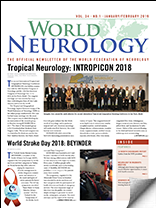By Dr. Temitope Hannah Farombi
As a beneficiary of the joint initiative of the World Federation of Neurology (WFN) and the Turkish Neurological Society fellowship, I was hopeful and expectant of the many opportunities this fellowship would offer. I was open to learning new skills as well as to improving on previously learned ones.

Ankara is a calm and serene city in Turkey with a mixture of old and modern outlooks. The people are warm, kind, and hospitable with smiles on their faces. Hacettepe University Hospitals sit at the center of the city with state-of-the-art neurological facilities. My mentor, Prof. Topcuoglu, introduced me to different units of neurology in the hospital. I had my first observership for 10 days at the neurophysiology lab under the supervision of Dr. Temucin and Dr. Gockem. Here I witnessed for the first time the clinical application of nerve conduction study, needle electromyography, and visual evoked potential protocols in the management of neurological disorders. Of note is a diagnosis of Guillain-Barré syndrome that was hitherto diagnosed as Bell’s palsy by the ENT surgeon.
During the second week, I attended the 54th annual Congress of the Turkish Neurological Society Nov. 30-Dec. 6, 2018, in Antalya. The conference provided opportunities to network with other neurologists in Turkey, and I was exposed to different cutting-edge research and new frontiers in neurological practice. I was fascinated by the deep and rich culture of practice in Turkey and the willingness to collaborate with other neurological societies in the region. This experience was most gratifying as it provided avenues for learning in a fun-filled environment.
During my last week, I observed acute stroke care in the intervention radiology unit and neurointensive care unit, where thrombolysis and thrombectomy were carried out on stroke patients. I also had a series of teaching sessions on nonepileptic psychogenic seizures and video electro-encephalography protocol with Prof. Serap.
Overall, my experience has made me realize the knowledge and technology gap we face as neurologists from sub-Saharan Africa and has stirred up the determination to know more by constantly improving myself through skill acquisition training and also increasing the advocacy for improved neuro care in our community.
I am really thankful for this great opportunity offered by the WFN, the Turkish Neurological Society, and the neurology department of Hacettepe University Hospitals. •
